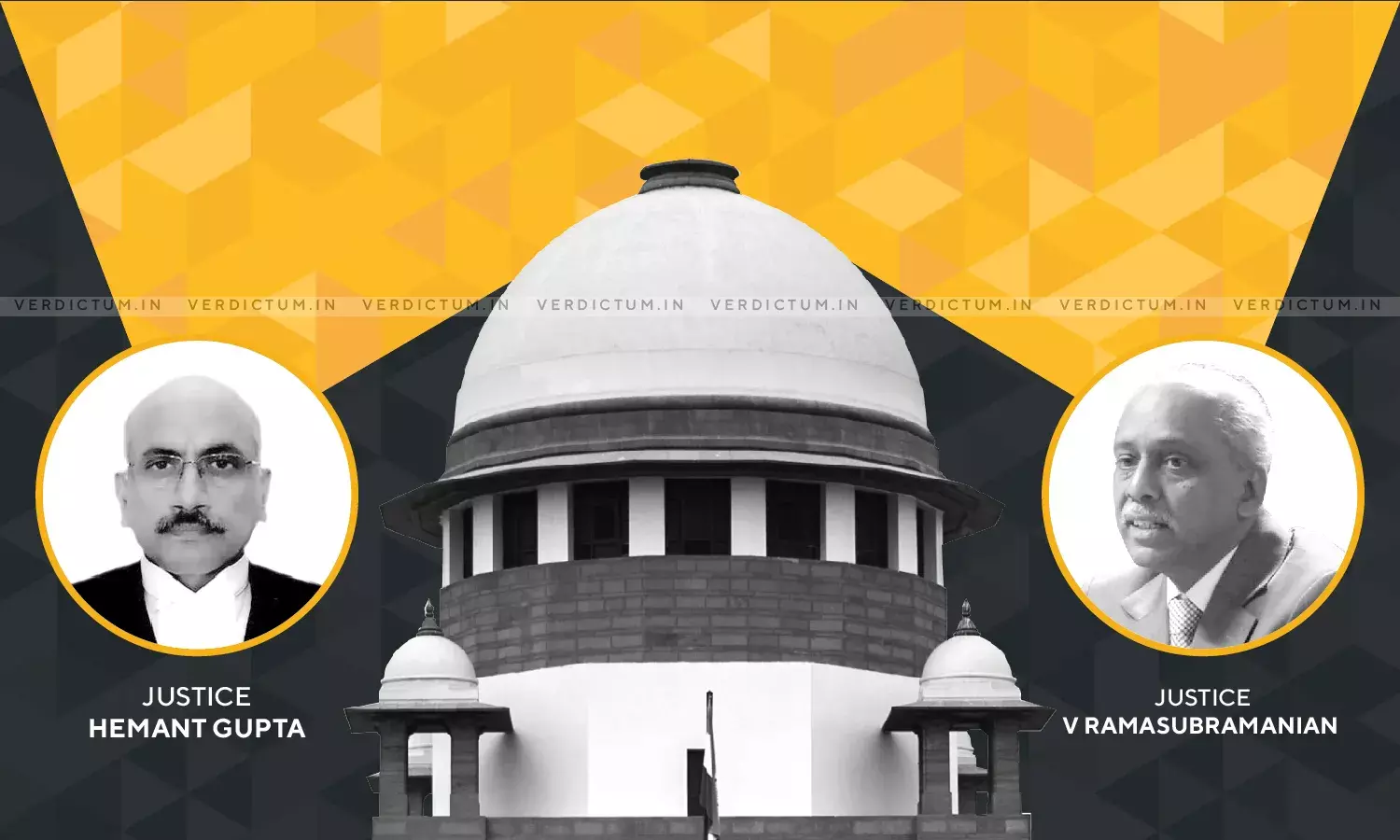Defendant Pleading Gratuitous Payment In A Suit For Recovery Has To Prove The Same: Supreme Court
A Supreme Court Bench consisting of Justice Hemant Gupta and Justice V. Ramasubramanian has ruled that in a suit for recovery of money, a defendant admitting the receipt of money but pleading that the same was a gratuitous payment, is obliged to prove that it was a gratuitous payment.
The Court also held that, "When payment of a certain amount of money and the repayment of only a portion of the same are admitted, the party pleading that such a part repayment was in full and final settlement, has a huge burden cast upon him to show that there was a settlement".
In this case titled Anita Rani Versus Ashok Kumar & Others the Bench dealt with two suits filed by the plaintiff, the appellant herein, for recovery of money. She contended in the first suit that the Respondents borrowed a sum of Rs.10,50,000 from her and later refunded Rs.5,00,000. They failed to honour the commitment and therefore the Respondents were liable to pay a sum of Rs.5,50,000 towards principal and a sum of Rs.4,98,000 towards interest thus totaling to Rs.10,48,000. The Respondents contended that the payment of Rs.5,00,000 was made as a full and final settlement.
The second suit was filed for recovery of Rs.67,31,000 to submit that the she and her husband were lured to join with the Respondents in their real estate business. Later they fraudulently withdraw an amount of Rs.54,50,000 from the bank by forging their signatures and they owe Rs.67,31,000 with interest. However, Respondent took the stand that the amount withdrawn was actually the investment made by the Appellant and her son and the transactions were part of the authorized payment.
The Trial Court dismissed the suits while the Appellate Court reversed the judgment. The Appeal filed by the Respondents allowed by the High Court, resulting in the dismissal of the suits.
Advocate Rajiv Bhalla appeared for the Appellant while Senior Counsel Nidhesh Gupta represented the Respondents.
The court noted that the Respondents examined party mediators but no receipt was taken from the Appellant to show the full and final settlement by paying Rs.5,00,000.
"The oral evidence of the so called third party mediators, is not sufficient to establish full and final settlement, in cases of this nature, where all transactions have happened only through banking channels and the defendants claimed that there were business transactions. It is unbelievable that the respondents, who reached such a settlement, failed to have the same recorded in black and white, either in the form of a memo or in the form of a receipt," the Bench stated.
The Court did not believe the affidavit put forth as evidence by the Respondents showing that the Appellant and her son were agreeing to treat a sum of Rs.30,00,000/ paid by the appellant, as a payment made out of love and affection.
"If, on 8.03.2006, the appellant and her son were gracious enough to treat a huge amount of Rs.30,00,000/ as one made out of love and affection, there could have been no occasion for a dispute requiring mediation at the intervention of third parties, on 7.8.2006, resulting in the payment of Rs.5,00,000/ by the respondents to the appellant in full and final settlement," the Bench opined.
"In simple terms, the case of the appellant plaintiff in the first suit was one of lending and non-payment. The defence set up by the respondents was one of payment of a lesser amount (than the original amount), in full and final settlement. A party who admits receipt of a certain amount of money on a particular date and pleads discharge by way of a full and final settlement at a later date, is the one on whom the onus lies," the Bench observed.
The Bench didn't believe a contention raised by the Respondent that the withdrawal of Rs.54,50,000 from the account of the Appellant by them were authorized payments for investment in real estate business as the Respondents couldn't furnish the accounts of the real estate business and show how those amounts were accounted for.
The Bench noted that the respondents could not produce any books of account. Therefore, the respondents thought it convenient to claim that all those amounts were investments in real estate business and that a portion of it was agreed to be treated as a gratuitous payment.
Regarding the affidavit produced by the Respondent qua payment of Rs30 lakh out of love and affection, the Bench observed thus, "If the parties have had business dealings from the year 2001 2002, it is hard to believe that a part of the amounts that flowed out of the account of the plaintiff, was out of love and affection. The only piece of evidence on the basis of which the gratuitous nature of payment is sought to be proved is Exhibit D3, but it does not contain the signature of the appellant. Therefore, the plea of gratuitous payment is unbelievable and was not established by the respondents."
The Court set aside the orders issued by the High Court and restored the order issued by the First Appellate Court, thereby decreeing the suit.
Click Here to Read/Download the Judgment




